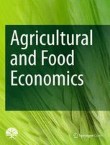Consumers preferences and social sustainability: a discrete choice experiment on ‘Quality Agricultural Work’ ethical label in the Italian fruit sector
The Italian legislator has adopted several instruments to discourage undeclared work and exploitative labour in agriculture, mostly of a penal-repressive nature. Among the direct and indirect policy measures, ...

